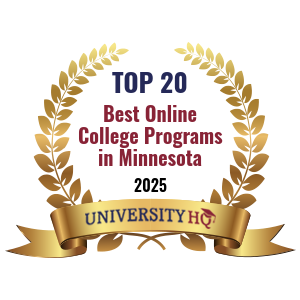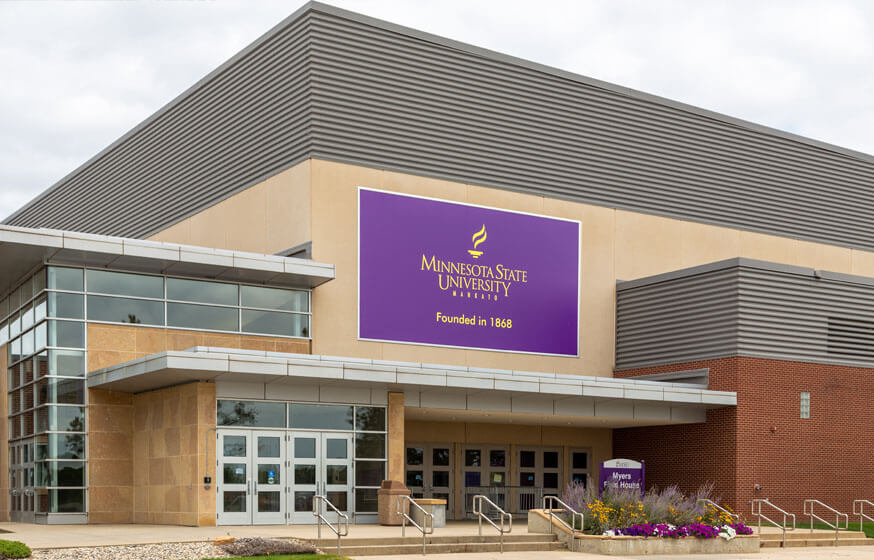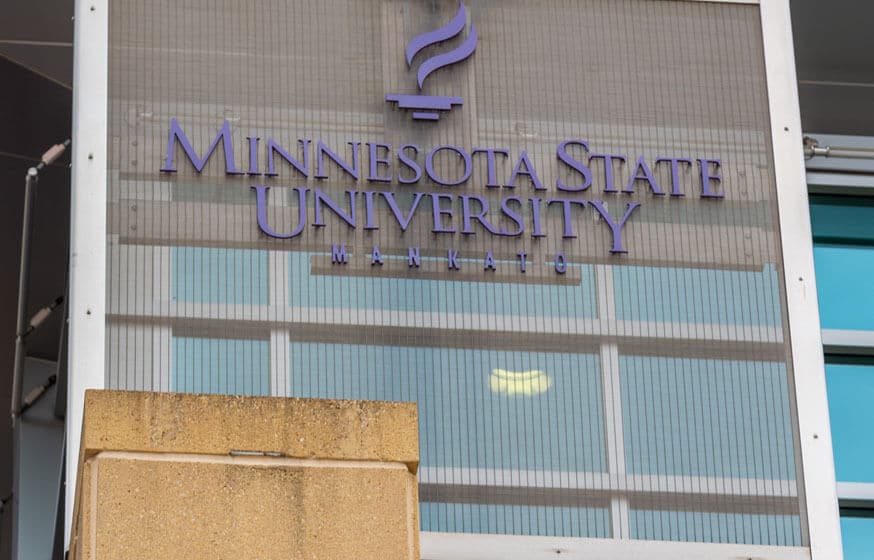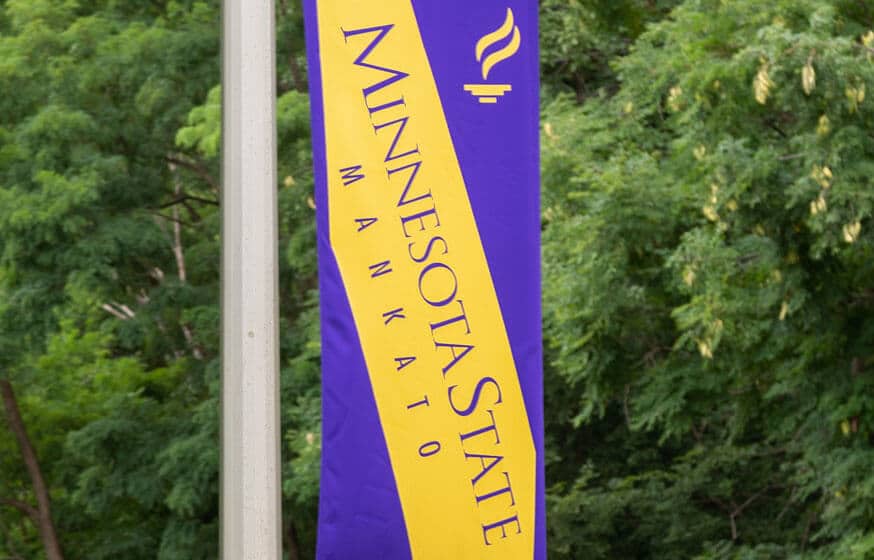University Headquarters (HQ) is an industry-leading, independent educational organization that provides independent college rankings using a proprietary formula to create first class unbiased rankings. The team at University HQ strives to provide accurate and trustworthy rankings that highlights the best programs.
Get Matched With Online Colleges
If you choose to attend Mankato, Minnesota, you’ll see that you’re one of thousands of students moving their belongings from cars to the dorm rooms available on campus. MSU is a public state university with a total student population of over 14,300 and a student-to-faculty ratio at 22 to 1.
Search All Programs
Overview of Minnesota State University - Mankato
MSU-Mankato is a public university that offers associate degrees along with bachelor’s, master’s, doctor’s degrees, post baccalaureate, and post-master’s certificates.
If you visit before you decide to attend, you’ll see that Mankato isn’t a particularly big campus. You’ll be able to get from one end of the city to the other end with little difficulty and it shouldn’t be any trouble to figure out where stores and restaurants are located so you can load your dorm refrigerator with foods you like and eat out occasionally with your friends.
General Information
| School Type | Public |
|---|---|
| Campus Setting | City: Small |
| Campus Housing | Yes |
| Student Faculty Ratio | 22:1 |
| Graduation Rate | 50% |
| Year Founded | 1868 |
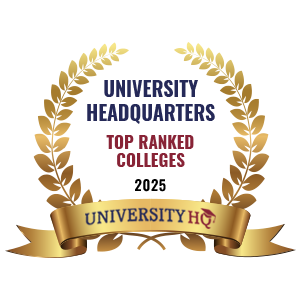
Student Enrollment
Total Students14,325
12,490
1,835
Undergraduate Student
Male 5,870
Female 6,620
Graduate Student
Male 862
Female 973
Explore Map
Top Rankings For Minnesota State University - Mankato
Admissions
APPLICATIONS10,349
ACCEPTANCE6,520
Acceptance Rate63%
Enrollment 2,282
| Admissions | |
|---|---|
| Application Fee | $20 |
| High School GPA | Required |
| High School Rank | Required |
| High School Transcripts | Required |
| College Prep Courses | Required |
| Recommendations | NA |
| SAT/ACT | Required |
| TOEFL (Test of English as a Foreign Language) | Required |
| Application Deadline | Rolling |
| Common Application Accepted | No |
Tuition Cost & Financial Aid
The total cost of attending MSU includes in- or out-of-state tuition, room and board, books, supplies, and other various charges (fees). In a recent school year, this total was $21,278 for the year.
However, you may not need to pay this whole cost. Colleges and universities track what’s called the ‘average net price’, which is the total cost to the student and their family after financial aid has been applied. For a recent year, this was $14,464. Depending on your parents’ annual income, which affects how much financial aid you are eligible for, you may pay a different amount. Families earning less than $30,00 paid around $11,057 but families earning more than $110,001 paid around $19,443. As you can see, depending on where you fall on the spectrum, your final cost may be very different from another student’s.
A total of 88% of freshman students qualified for financial aid in a recent year. Fewer (59%) received grants or scholarships averaging $5,537; and 29% received an average of $3,153 in institutional grants and scholarships.
| Average net price | 2018-2019 |
|---|---|
| Net Price | $14,464 |
| Average Total Aid | $5,537 |
| Students Receiving Financial Aid | 88% |
| Room & Board | $9,854 |
Sticker Price
- Tuition In-State - $8,438
- Tuition Out-of-State - $16,730
- Books and Supplies - $1,042
- Room & Board - $9,854
- Other - $1,944
Academics
Whether or not you already know what you want to major in, or not, it’s important to always be aware of what majors and minors a school has on offer before making a decision about attending. The most popular degrees offered on the Mankato campus of Minnesota State University are business, management, marketing and related support services; health professions and related programs; education; parks, recreation, leisure and fitness studies; and communication, journalism and related programs. You can check out the school catalog on their website to look for a specific program you’re feeling drawn to and see if they have what you need.
Despite how carefully you and your advisor work to make sure your classes don’t conflict with each other, it’s still possible that they may end up conflicting with a job or another responsibility you take on outside of school. Luckily, MSU offers distance learning (online) classes, though it doesn’t offer evening classes. You can ask about alternatives to the class that’s in conflict in order to resolve these types of issues.
If you decide to stick with this school from your freshman to your sophomore year, you’ll be a part of the retention rate. This tracks the percentage of first-time students who return for their second year. At MSU, this number is excellent, as 77% find themselves returning after their freshman year. The 4-year graduation rate is a bit low at 26%, though not alarmingly so, since many public colleges have low overall graduation rates and significant transfers between the first and fourth year. The 6-year graduation rate is nearly double at 49%.
Retention
Rate
4 year
Graduation
Rate
6 year
Graduation
Rate
Student Population Total
Student Population 14,325
12,490
1,835
Most Popular Programs & Majors
(# of Diplomas Awarded by Subject)
| All Business Majors | 471 Total Graduates / 20% |
|---|---|
| Business Administration and Management, General | 132 Graduates |
| Marketing/Marketing Management, General | 107 Graduates |
| Finance, General | 70 Graduates |
| Accounting | 65 Graduates |
| Health Professions and Related Programs | 385 Total Graduates / 16% |
| Registered Nursing/Registered Nurse | 240 Graduates |
| Dental Hygiene/Hygienist | 52 Graduates |
| Communication Sciences and Disorders, General | 33 Graduates |
| Community Health Services/Liaison/Counseling | 30 Graduates |
| All Education Majors | 181 Total Graduates / 7% |
| Elementary Education and Teaching | 96 Graduates |
| Special Education and Teaching, General | 34 Graduates |
| Health Teacher Education | 11 Graduates |
| English/Language Arts Teacher Education | 9 Graduates |
| Parks, Recreation, Leisure, and Fitness Studies | 149 Total Graduates / 6% |
| Health and Physical Education/Fitness, General | 59 Graduates |
| Parks, Recreation and Leisure Facilities Management, General | 47 Graduates |
| Sport and Fitness Administration/Management | 43 Graduates |
| Communication, Journalism, and Related Programs | 137 Total Graduates / 6% |
| Speech Communication and Rhetoric | 93 Graduates |
| Mass Communication/Media Studies | 44 Graduates |
| All Other Diplomas | 45% |
Outcome & Salary
Let’s look forward four years and say that you’ve graduated from college and found a position in your degree field. Your salary will depend on your career, but you can still consider how other graduates have done in the past a good indicator of their success. Minnesota State University at Mankato graduates earn an average of $46,700 in their early careers. By their mid-career, their salaries increase on average to $65,900 a year. Those are around the average for most public institutions and, of course, if you earn a degree in a particularly lucrative field, you’ll be at the top of the spectrum that created this average.
Based on these numbers, your 10-year salary earning potential is $666,500 and your 20-year earning potential is $1,325,500. If you then deduct your 4-year cost of education (an average of $57,856), this can give you your projected return on investment (ROI). After all this, a graduate’s 10-year projected ROI is $608,644 and their 20-year projected ROI is $1,267,644.
By contrast, a high school graduate who goes straight into a job earns a national average salary of $38,792. Their 10-year projected income is $387,920 and their 20-year projected income is $775,840.
| Graduates Salary | |
|---|---|
| College Grads Early Career Salary | $46,700 |
| College Grads Average Salary | $66,650 |
| College Grads Mid Career Salary | $65,900 |
| Return on Investment (ROI) | |
|---|---|
| 10 Year Salary Earnings Potential | $666,500 |
| 20 Year Salary Earnings Potential | $1,325,500 |
| Cost of Education (Net Price) 4 Year | $57,856 |
| 10 Year Projected ROI | $608,644 |
| 20 Year Projected ROI | $1,267,644 |
| No College Education Salary Comparison | |
|---|---|
| National Average Salary | $38,792 |
| 10 Year Projected Income | $387,920 |
| 20 Year Projected Income | $775,840 |
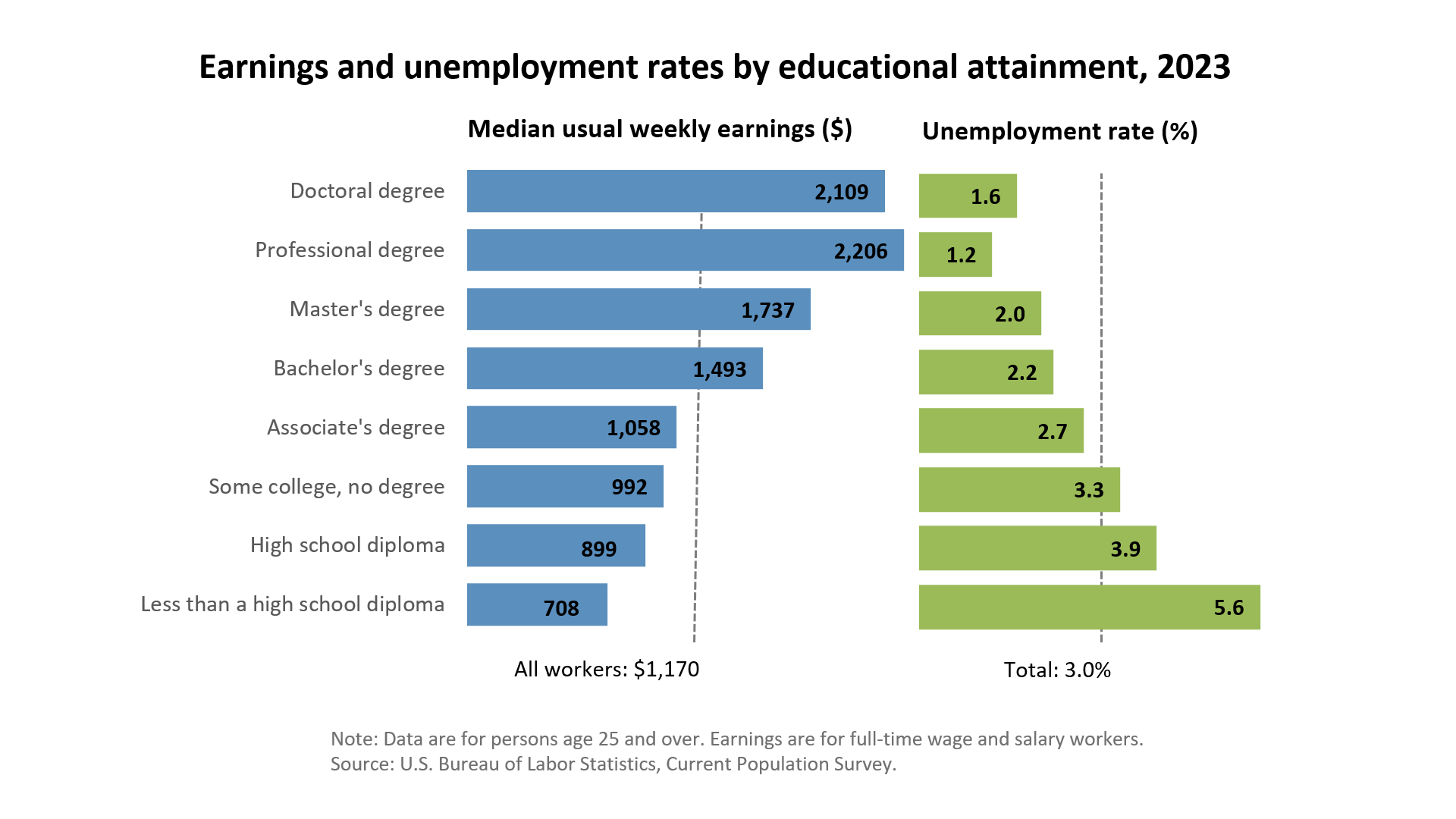
Related Top College Resources





